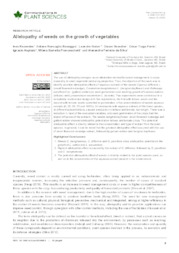Allelopathy of weeds on the growth of vegetables.
Allelopathy of weeds on the growth of vegetables.
Author(s): REZENDES, I.; BASEGGIO, E. R.; GALON, L.; BRANDLER, D.; FORTE, C. T.; ASPIAZÚ, I.; FRANCESCHETTI, M. B.; SILVA, A. F. da
Summary: The use of allelopathy emerges as an alternative method for weed management in crops, especially in small vegetable producing properties. Thus, the objective of this work was to identify possible allelopathic effects of aqueous extracts of the weeds Cyperus difformis L. (small-flowered nutsedge), Commelina benghalensis L. (benghal dayflower) and Galinsoga parviflora Cav. (gallant soldier) on seed germination and seedling growth of Lactuca sativa L. (lettuce) and Lycopersicum esculentum L. (tomato). Two experiments were carried out in a completely randomized design with five replications, the first with lettuce seeds and the second with tomato seeds submitted to germination in five concentrations of weeds aqueous extracts (0, 25, 50, 75 and 100%). All treatments with aqueous extracts of the three species, at different concentrations, caused a reduction in lettuce and tomato root length. There was a reduction in most of the evaluated variables, and seed germination of the crops had the lowest influence of the extracts. The weeds benghal dayflower, small-flowered nutsedge and gallant soldier showed allelopathic potential on lettuce and tomato crops. This potential allelopathic effect is directly related to the concentration and type of extract from the plant species. In general, it can be noted that the greatest allelopathic effect occurred with the use of small-flowered nutsedge extract, followed by gallant soldier and benghal dayflower.
Publication year: 2020
Types of publication: Journal article
Unit: Embrapa Maize & Sorghum
Observation
Some of Embrapa's publications are published as ePub files. To read them, use or download one of the following free software options to your computer or mobile device. Android: Google Play Books; IOS: iBooks; Windows and Linux: Calibre.
Access other publications
Access the Agricultural Research Database (BDPA) to consult Embrapa's full library collection and records.
Visit Embrapa Bookstore to purchase books and other publications sold by Embrapa.

